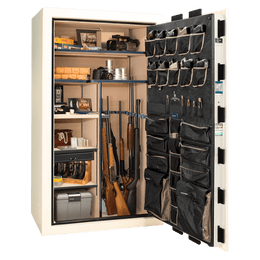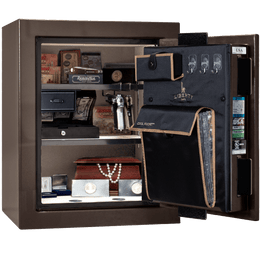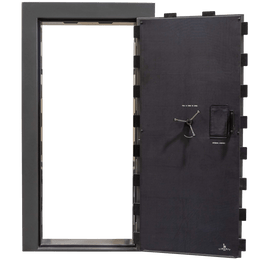Fire-rated gun safes and home security systems can help minimize fire damage to your firearms, valuables and home, but isn’t it better to prevent fires in the first place? Of course it is.
To help you reduce the risk of fire in your home, we’ve put together this list of common fire hazards and what you can do to help mitigate the risk of fire. At Liberty Safe, our goal is to keep your valuables safe and secure from unauthorized access as well as fire, and we offer these tips to keep your home safer and reduce your fire risk.
In this 5-minute read with lifesaving tips:
- How dangerous are house fires?
- Top causes of home fires and deaths
- How you can help prevent fires in your home
- Proper use of smoke detectors
- Open flame considerations
- Electrical fires
- Cooking safely
- Smoking doesn’t just threaten your health
How dangerous are house fires?
House fires are pretty dangerous. According to the National Fire Protection Association, around four out of every five fire deaths are caused by home fires.
During the most recent five-year period examined, U.S. fire departments responded to an estimated average of ~350,000 home structure fires per year. These fires caused an annual average of 2,620 civilian deaths, 11,030 civilian fire injuries, and $7.2 billion in direct property damage.
What are the top causes of home fires and fire deaths?
Most home fires and fire casualties are caused by the following 5 things: cooking, heating, electrical distribution/lighting equipment, intentional fire setting, and smoking materials.
Which causes are the worst? Over the five-year period recently studied by the NFPA, cooking was the leading cause of home fires and home fire injuries, while smoking was the leading cause of home fire deaths.
The good news is that there’s a lot you can do to help protect yourself and your family from the unthinkable devastation of a house fire.
In this article, we’ll cover the most common culprits behind house fires, and also go over some of the things you can do to reduce your risk.
Watch How a Liberty Safe Survived in a Real House Fire
Fire protection 101: smoke detectors
First, let’s talk about smoke detectors. Smoke detectors technically don’t PREVENT every fire, since obviously you need some sort of ignition source to create the smoke that the sensors can detect. However, smoke detectors can alert you to smaller issues and allow you to rectify the situation before it becomes deadly and damaging, and they are also vital in providing advanced warning of dangerous fires so you can get people out of your home in time to save their lives.
Making sure you have functioning smoke detectors properly spaced throughout your home is critical. Regularly inspecting your smoke detectors, cleaning them, and replacing their batteries regularly is one of the most important things you can do for your family’s safety.
A typical home smoke detector has two sources of power—a primary wired connection, and a backup battery in case the power goes out. To work properly and most safely, a smoke detector needs both.
Smoke detectors also wear out over time, even if they never “go off” and are maintained regularly. Most will need to be replaced every 10 years. To make sure that the detector is both powered and functional, test it every 6 months, and replace the backup batteries every year at the very least.
Testing a smoke detector is usually done by holding down the “test” button until the smoke detector beeps. If it doesn’t, it either doesn’t have power or it has exceeded its lifespan and needs to be replaced. Make sure it’s connected and has a fresh battery and test again. If it still doesn’t work, replace the smoke detector.
Sometimes smoke detectors start beeping “false alarms” or chirping even when the batteries are fresh and the connection is sound. This can be indicative of a spider or other insect that has made its way into the sensor area, or sometimes dust or soot can collect in the sensors. You may try blowing the detector out with compressed air and see if the issue is rectified. Otherwise, the detector may be due for a replacement.
Open flame, wood stoves, fireplaces, grills, candles, etc.
Fireplaces, wood stoves, candles, and charcoal grills all involve open flame and are potentially hazardous causes of house fires.
Keep flammable materials and objects well away from these sources of flame, and avoid leaving open flames unattended. Remember to extinguish flames fully before leaving the house or going to bed.
Fireplaces should be covered with a screen to prevent sparks from escaping. Ashes should be removed regularly, and chimneys should be properly cleaned regularly to reduce creosote buildup. (Chimney fires are common sources of devastating house fires.)
Modern wood stoves are safer than open fireplaces, but should still be regularly cleaned similarly to a fireplace. And of course, inspect and clean your chimney regularly to prevent obstructions and flammable buildup.
Candles should always be supervised so that they’re not knocked over accidentally or dripping potentially flammable wax on surfaces. Sure, a nice candle-lit bedroom is romantic, but make absolutely sure the flames are extinguished before you fall asleep.
Cooking causes the most fires and injuries
First and foremost: keep flammable objects away from cooking surfaces. It’s easy to let countertops get cluttered with plastic containers and bottles, potholders/hot pads, cleaning cloths, paper towels, etc., but keep the countertops next to your stovetop clean and clear.
And of course, never leave the stove unattended, and never leave the house with the oven on. Both can easily cause fires if left unsupervised. Set alarms and reminders for you to turn the stove or oven off if you have to step away into another part of the house for a minute.
Be extra careful when cooking with oil. Use a deep-fry thermometer to prevent overheating your oil, and don’t fill your pan too full. Make sure any food you’re frying is thawed and patted dry before you insert it in the oil, and if a pan of oil is overheated or spills over and catches fire, NEVER pour water on it. Dust it with baking soda or use a suitable chemical fire extinguishing agent, and/or put a lid on it, instead.
Electrical sources of fire
Electrical shorts and circuit overloads are common causes of house fires. Inspect all your appliance and device power cords regularly. If they become damaged or worn, replace them immediately.
If you have an older home, have a professional electrician check for faulty wiring or overloaded circuits. The most common symptoms are repeatedly tripping breakers or blown fuses, lights dimming when using an appliance, or needing to unplug one appliance to get another one to work.
Keep an eye out for problems with outlets. If an outlet is discolored or warms up when used, have it replaced and the wiring inspected.
Don’t overload power strips or extension cords, and replace any that become damaged or worn.
Keep flammable objects away from lamps and other light fixtures, and consider switching to LED bulbs (which usually produce much less heat than common incandescent bulbs).
MORE GUN SAFE SURVIVAL STORIES
News flash: smoking is hazardous to more than your health
Cigarettes, pipes, and cigars can cause house fires if not used and discarded properly. Smoking is the leading cause of deaths by house fires, typically by people falling asleep while smoking in bed.
Consider limiting your smoking to the outdoors, and be sure to completely extinguish cigarette butts and cigar tips before throwing them in the trash. Don’t dump pipe ash into the garbage pail, and make sure lighters, matches, and other sources of flame are in good working order and kept well out of the reach of children.
Children and youth are the cause of thousands of house fires every year
Intentionally started fires are one of the top 5 most common causes of home fires in the U.S., and that doesn’t necessarily mean “arson.” Kids and teens playing with aerosols, matches, lighters, gasoline, and other flammable materials is a huge cause of deadly house fires.
Be sure to keep flammable liquids and fire-starters away from children and teens, and educate kids about the potential dangers associated with playing with fire. When kids see informational videos about burn victims who suffered injury while playing with fire, for example, they may be less likely to play with fire and be potential causes of a home fire.
Liberty Safe offers top-rated fire protection
Remember, our USA-made home safes offer UL-listed fire protection to keep your valuables protected, even in the case of a serious house fire. Check out our line of home safes or visit a Liberty Safe showroom near you.







